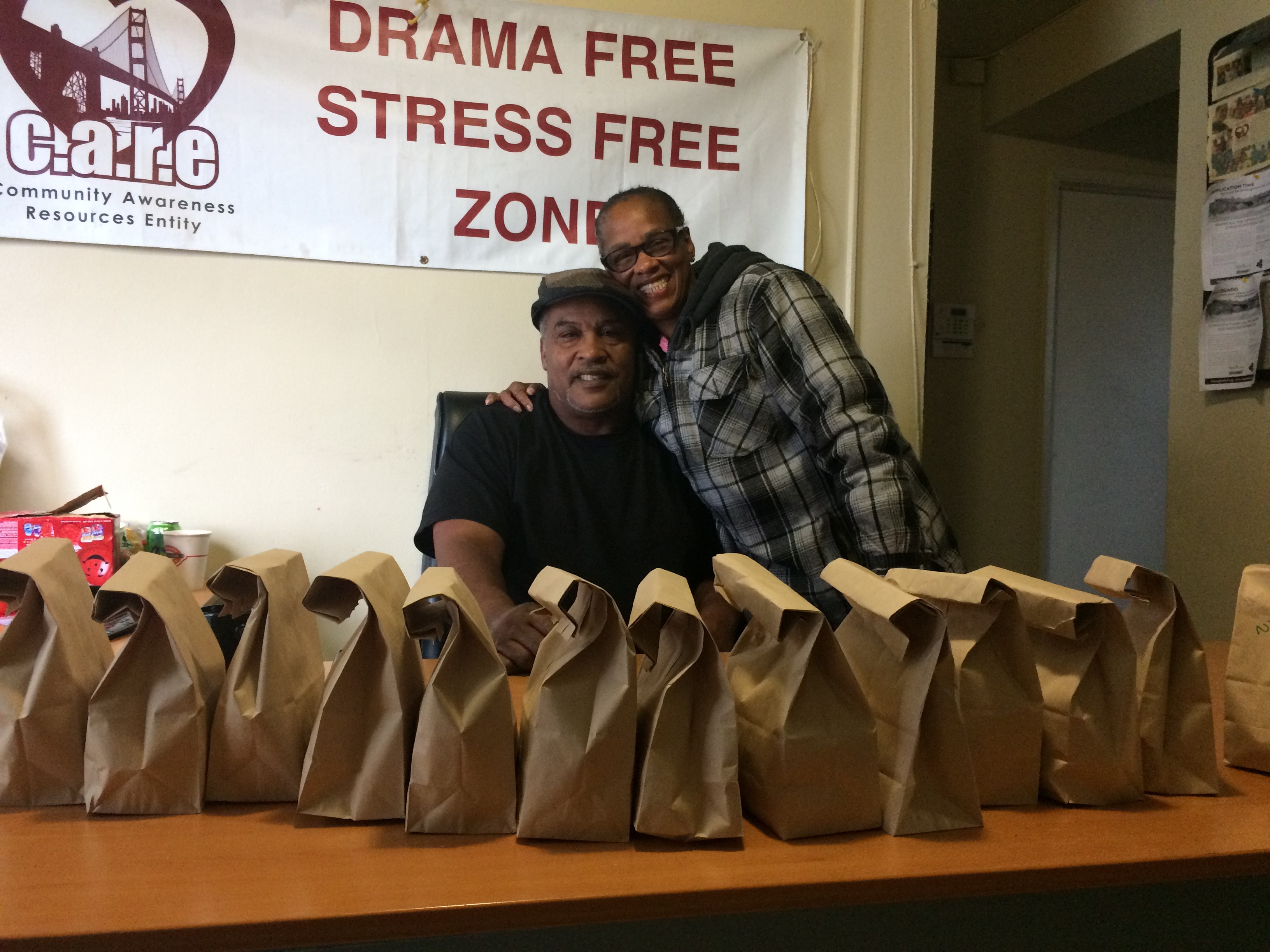Uzuri’s Story
 Photo by HOPE SF Staff.
Photo by HOPE SF Staff. Hours before dawn spreads over the Potrero Terrace and Annex housing project, Donald Greene is working hard on sandwiches. This child wants one with no mayo. That child doesn’t eat peanut butter. He adds a granola bar, some fruit snacks and a cutie, and places each in a carefully labeled paper bag.
Depending on the time of the month, he may be assembling more than 30 lunches. He takes this responsibility seriously — for some children, this might be the only meal they’re eating that day.
Donald, 58, and his wife Uzuri Pease-Greene, 53, have been residents of the housing project — located on a ridge above San Francisco’s Potrero Hill — since 2001. For a few years before that, they’d been living on the streets and using drugs. Uzuri remembers the day they walked into their apartment for the first time with nothing but a blanket, some pillows and a small black-and-white TV.
“We were the happiest people on earth because it was ours,” she said. “We slept on the floor for a couple weeks, and we didn’t care.”
With time and a few false starts, Uzuri was able to get clean and sober. A few years later, Donald quit, too.
In 2009, Uzuri spent six months in HOPE SF’s leadership academy, learning how to speak out for her community’s needs.
“It woke up the voice I already had,” she said.
The next year, she joined Bridge Housing as a community builder, and worked hard to improve trust and communication between the developer and her neighbors.
Uzuri knows the new units being built in Potrero are necessary — the current units are around 75 years old, and plagued by mold, broken plumbing, cockroaches and rodents.
At the same time, she understands why many in the community are anxious about the transition, fearing that gentrification will eventually push them out in the city.
Six years ago, Uzuri and Donald — along with their friend, Billy Ray Courtney — embarked on a new project.
Tired of all the shootings afflicting their community, they decided to take over the vacant unit downstairs from their apartment. Squatters had been living there, Uzuri said, and the smell was so putrid she couldn’t stand to be inside.
The housing authority gave them the unit, and they scrubbed and cleaned and painted, and eventually turned it into the headquarters for their new nonprofit — the Community Awareness Resources Entity, or CARE.
Their goal: to create a safe haven, free of judgment, for the people in their community. Their little grassroots organization wears many hats: Donald takes kids from the community out on fishing trips; Uzuri organizes outings to Disney on Ice. They run a women’s group, a men’s group and a sober living group. Once a month, they host a community meeting where residents can bring concerns directly to the police chief. At the holidays, they hold a children’s toy give away — the line stretches down the block. And they are grateful for the support they receive from HOPE SF, as well as YMCA Urban Services and other entities.
Six years ago, they started a communitywide Thanksgiving dinner. More than 120 residents dragged grills and folding tables into the parking lot across the street to eat turkey together. Since then, the dinner has doubled in size.
“This is a thriving community,” Uzuri said. “There are just a lot of good things happening.”
Today, the walls are lined with photos, inspirational mottos (‘Nobody’s free until everybody’s free’) and awards for their work. Most recently, the organization received the Jefferson Award for its work.
Donald started making the lunches three years ago, when his granddaughter came to visit with a little girl who had nothing in her lunchbox.
“You don’t ask a kid why they have an empty lunch pail,” Uzuri said. Instead, she said, you fill it.
Word got out. More children came around. Uzuri, Donald and Billy Ray buy the food out of their own pockets, with help from other residents.
In January, Donald was out for a week for heart surgery and couldn’t get up to make lunches. The kids were not impressed with his excuse, he laughs: “I was in the doghouse.”
In recent years, Donald and Uzuri have seen a lot of changes in their community — people trust each other more, neighbors watch out for each other’s packages and encourage each other to get back to work and school.
“It still has a long way to go,” Uzuri said, “but it’s come a long way.”

